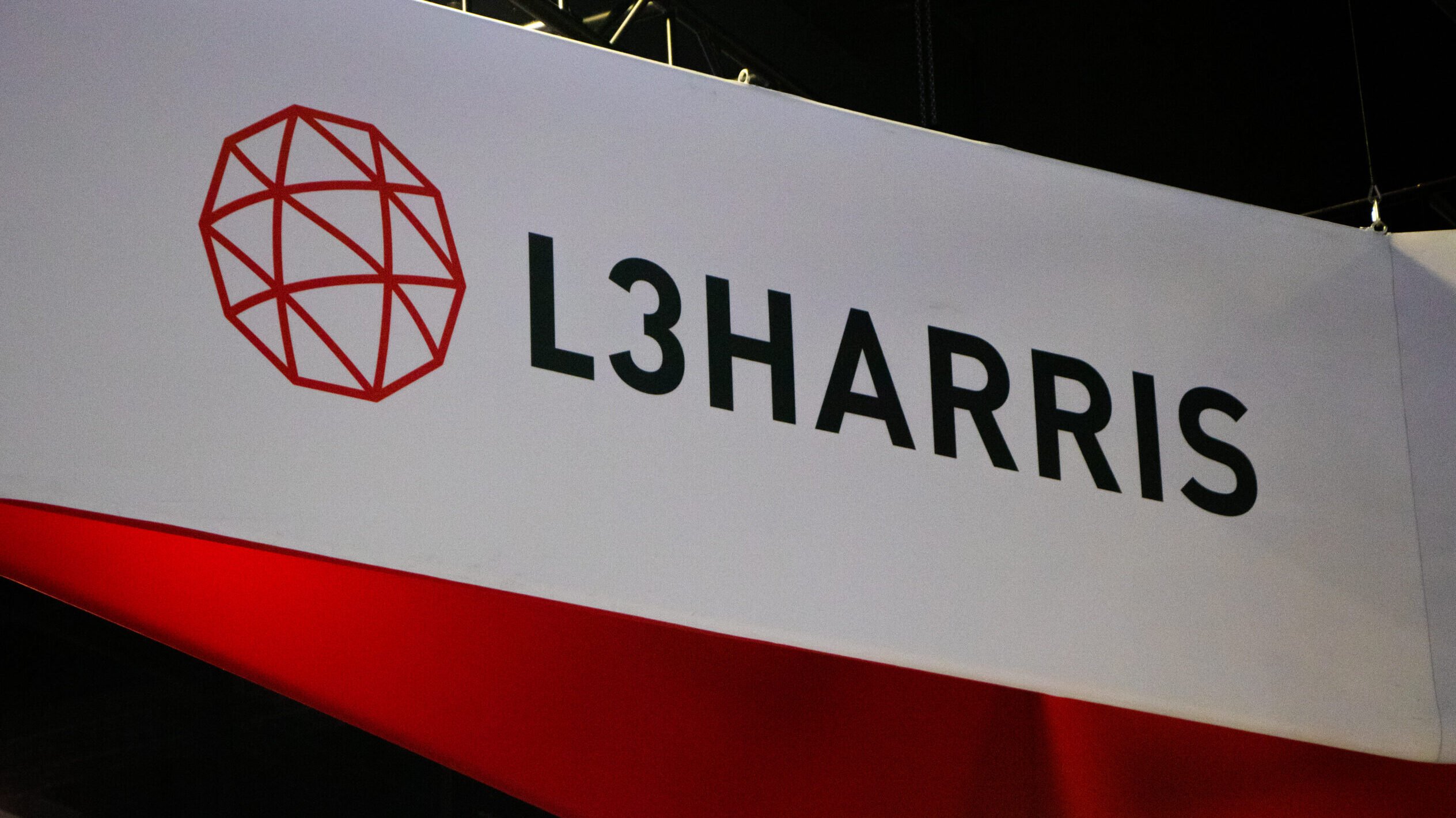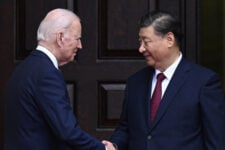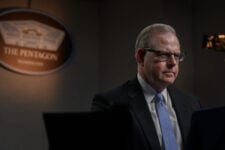
The L3Harris logo is seen on the floor of the 2022 Air Force Association conference in National Harbor, Maryland. (Justin Katz/Breaking Defense)
WASHINGTON — L3Harris is actively lobbying leaders in the Pentagon and Congress to create a definition of what “resilient communications” means, as the defense giant seeks to fend off a growing interest for commercial communications providers from the military.
Speaking to reporters Wednesday, Samir Mehta, L3Harris’s president of communication systems, said the company was “talking to OSD leadership. We’re talking to service leadership. We’re talking to PMAs, we’re talking to PEOs. We’re carrying this message to all levels and all echelons.”
That message, at its core, is asking leadership to quite literally “define resilience” in a fundamental way that provides a standard across the military. Without spelling out exactly what the company wants that to look like, Mehta leaned heavily throughout his comments on the idea of high security waveforms that can’t be intercepted or jammed as easily as commercial capabilities.
“Right now, you and I can go to a Cabela’s, we can buy a radio, we can go to a trade show, put it out on a table, and we can say it’s a form of resilient communication, because there’s no standard,” Mehta said. “It’s time that we have a standard.”
The Pentagon’s Chief Information Officer is a main point of contact, Mehta said, adding that L3Harris is also talking to Congress on this issue. He didn’t rule out pushing for language to be included in the upcoming fiscal 2025 National Defense Authorization Act.
Mehta compared the push to the kind of standardization for encryption that has come out of the National Security Agency, noting, “Is it complicated? Probably will take some time and effort. Is it unobtanium? No, we’ve done this, we’ve proven the ability to do this in other areas.
The Defense Department is hardly alone among world militaries in looking to the commercial sector to see whether cheaper options are available. And Mehta was quick to note that there are plenty of good use cases for those unsecured comm links, such as the ability to connect servicemembers in the field to their families back home.
But “The concerning trend we see is that the budget pressures have caused some leaders in DoD, and a lot of our customers, to turn to [commercial comms] as a means of military communications,” Mehta said. “And some of these commercial providers provide a little bit of, I’ll call it the easy button. And so for us, it’s important to remind [DoD that] the easy button isn’t always the best button, especially if you’re taking missions and planning to potentially fight — hopefully not — but potentially fight in a highly contested environment versus a near peer adversary.”
RLEATED: Pentagon working with Ukraine, SpaceX to prevent Russian exploitation of Starlink
The clearest example is the SpaceX Starlink terminal, which had much ballyhooed success in Ukraine — but which has also raised concerns, in part because of founder Elon Musk’s unpredictable nature and business dealings with China.
Relying on traditional defense firms means the Pentagon is “not entirely subject to the whims of one commercial owner of the company, or shareholder of the company, who happened to wake up in Beijing 48 hours ago to try to sell more Tesla’s and more EVs,” Mehta said. “So the question that we’re posing to our military leadership is, who do you trust?”
Despite the concerns about the Pentagon’s leanings towards the commercial sector, Mehta expressed confidence that his business is in healthy shape, citing a “record backlog” for the Harris-branded radio unit, to the point the company is transforming its Rochester, New York, production facility from split civil-military production to pure defense. That transformation should be done by the end of the year, with Mehta saying it should result in 5,000-7,000 more radios produced each year over the 2024 total of 70,000.
Driving that is “unprecedented demand” from Europe, he added, saying the company is now poised to book “close to a billion dollars in business from our European partners and allies.”
HASC pushes for reciprocity guidance for cloud computing in draft NDAA language
The legislation proposes that if one office in the department officially deems a “cloud-based platform, service, or application” is sufficiently cybersecure to use, then all parts of DoD can accept this ATO.


























